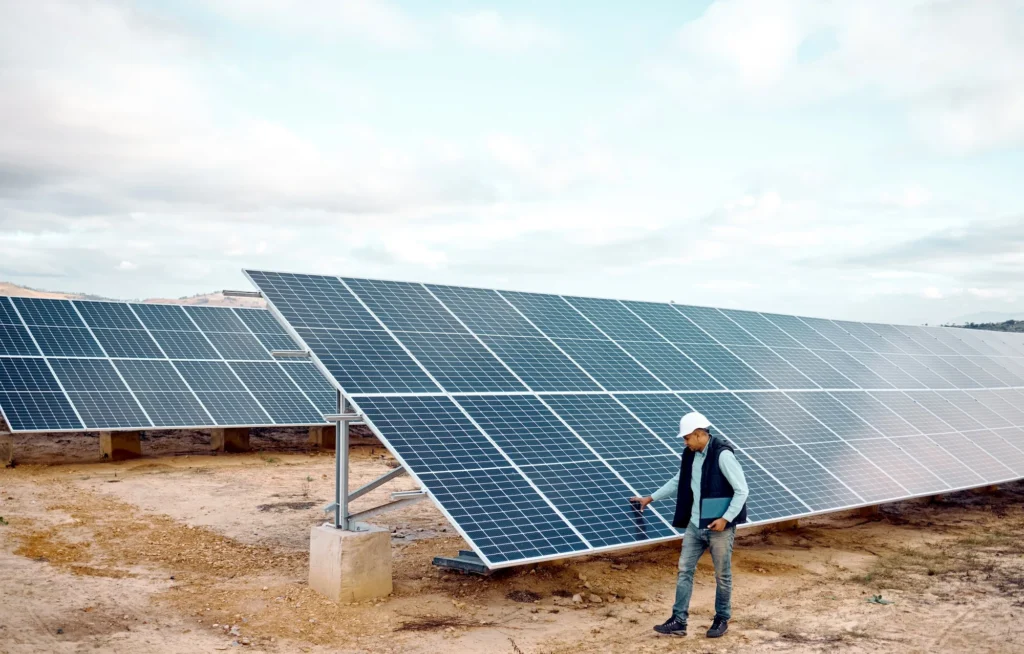United Arab Emirates (UAE) has reached a significant milestone in its renewable energy journey, achieving a record-high solar power capacity in early 2025. This development underscores the nation’s commitment to sustainability and its strategic efforts to diversify its energy mix in alignment with global climate goals.
United Arab Emirates Expanding Solar Projects
Driven by large-scale solar initiatives and cutting-edge technological advancements, the UAE has seen a remarkable increase in its solar energy production. The Mohammed bin Rashid Al Maktoum Solar Park, the world’s largest single-site solar park located in Dubai, has been a key contributor to this achievement.
The Abu Dhabi-based Noor Abu Dhabi Solar Plant, one of the largest solar projects in the Middle East, has also played a significant role in enhancing the nation’s solar capacity. These projects have collectively boosted the UAE’s capacity to generate clean energy and reduce its dependence on traditional fossil fuels.

According to the UAE’s Ministry of Energy and Infrastructure, the nation has surpassed the 5 GW solar power capacity mark, which now accounts for a substantial portion of its total energy generation.
Commitment to Net-Zero Goals
The UAE’s push for solar energy aligns with its ambitious target to achieve net-zero emissions by 2050. As one of the first countries in the region to make such a commitment, the UAE has implemented a series of initiatives to promote renewable energy development and reduce carbon emissions.

Speaking on the achievement, an official from the Ministry of Energy stated, “This milestone is a testament to our dedication to building a sustainable and resilient energy sector. We will continue to invest in renewable energy projects and innovative technologies to ensure a cleaner and greener future for generations to come.”
Technological Innovation
The surge in solar capacity has been fueled by advancements in solar panel technology, battery storage solutions, and smart grid systems. The UAE has embraced innovative technologies such as bifacial solar panels, which capture sunlight from both sides, and AI-driven energy management systems to optimize solar power generation.
Additionally, research and development centers across the UAE have been exploring new ways to increase the efficiency of solar panels and reduce the environmental impact of solar installations.
Private Sector Involvement
The private sector has played a crucial role in driving the UAE’s solar power expansion. Major companies have invested in solar projects and adopted solar energy solutions for their operations.
Dubai Electricity and Water Authority (DEWA) has launched initiatives to encourage businesses and homeowners to install rooftop solar panels as part of the Shams Dubai program. This initiative has significantly contributed to the decentralized production of solar power in the emirate.
Economic and Environmental Impact
The growth in solar power capacity has not only contributed to the UAE’s environmental sustainability but also created economic opportunities. The renewable energy sector has generated jobs and attracted investments from both local and international companies.
Furthermore, the shift to solar energy has helped reduce the country’s carbon footprint, supporting its commitment to the Paris Agreement and the UN Sustainable Development Goals (SDGs).
Regional and Global Leadership
The UAE’s leadership in solar energy has positioned it as a pioneer in renewable energy within the Middle East and on the global stage. The nation’s success story serves as a model for other countries in the region looking to transition to clean energy.
The UAE has also been a key player in international renewable energy initiatives, hosting major events such as the World Future Energy Summit and participating in global climate conferences.
Future Outlook
Looking ahead, the UAE has ambitious plans to further increase its solar power capacity. The country aims to generate 50% of its energy from clean sources by 2050. Upcoming projects, including the expansion of the Mohammed bin Rashid Al Maktoum Solar Park and the development of new solar farms in Abu Dhabi, are expected to contribute significantly to this goal.
The UAE’s ongoing investments in renewable energy, combined with its strategic vision and technological advancements, will ensure that it remains at the forefront of the global clean energy movement. As the nation continues to break records and set new benchmarks, it serves as an inspiration for sustainable development worldwide.
By achieving this record-high solar power capacity in early 2025, the UAE has reinforced its position as a leader in the renewable energy sector and demonstrated its unwavering commitment to building a sustainable future.
Do follow Uae stories for more Updates
UAE Authorities Crack Down on Counterfeit Electronics Worth Dh40 Million












